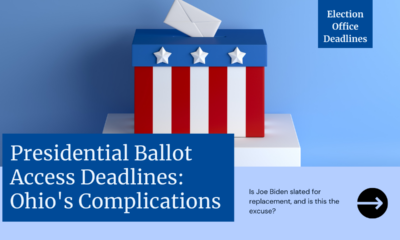Executive
ObamaCare citizen’s solutions

All eyes and ears are upon President Trump and the Republican Party waiting for a proposal to replace ObamaCare. According to media chatter, this new proposal may include being able to purchase health insurance across state lines, health care savings plans, keeping your plan and doctor if you so desire, and being allowed to keep adult children that are living under your roof covered until they reach the age of 26, and of course, the coverage of pre-existing conditions. All these options would be good ones; still, the elephant in the room continues to be how to cover the indigent and/or those that simply have not purchased their own insurance for one reason or another.
However, expecting government to fix the problems they have created has always proven disappointing. Remember the War on Poverty? Well, that created poverty exponentially, as well as destroying many urban families in the process. And of course there is the Department of Education that fixed our educational system from being number one worldwide to a dismal 27 out of the 27 countries studied. Add to that the War on Drugs and all the entitlement programs that were meant to be help those in need, and the expectation for government solutions should rightfully be low or non-existent.
Therefore, any suggestion or remedy proposed by any ordinary citizen should be respected.
A few ObamaCare solutions
Regional clinics
 Healthcare for those who have not purchased their own – regardless of their reason – the government should allocate monies to every state to build regional clinics that are geographically accessible for all. These clinics should provide new healthcare personnel an opportunity to learn under the tutelage of an experienced professional – and all hospitals within the clinics’ regions should require their professionals to participate in the program. This requirement should extend to all hospital personnel in order to ease the time requirements – especially when considering that all hospitals within the region would be required to participate.
Healthcare for those who have not purchased their own – regardless of their reason – the government should allocate monies to every state to build regional clinics that are geographically accessible for all. These clinics should provide new healthcare personnel an opportunity to learn under the tutelage of an experienced professional – and all hospitals within the clinics’ regions should require their professionals to participate in the program. This requirement should extend to all hospital personnel in order to ease the time requirements – especially when considering that all hospitals within the region would be required to participate.
The hospital would be required to pay for the time their professionals donate to the clinic, which should actually be a savings compared to all the non-paying patients they are forced to accommodate. This would also offer an opportunity to newly graduated healthcare professionals to learn under the auspices of those more experienced, creating teaching clinics in the process, which if operated correctly would prove to be as excellent as teaching hospitals have proven to be over the years. Hospitals that do not participate should be fined substantially, with the fined amounts being re-invested in the regional clinics.
In addition to the uninsured being able to receive good medical care, they also would be billed for the care they do receive, with a lenient pay-back schedule taken into consideration with limits on billing for catastrophic care.
This issue is perhaps one of the most important issues, since a prosperous nation feels a responsibility to provide such services to those that cannot provide for themselves. The danger, of course, is always if the benevolence of the prosperous is taken advantage of by those who are fully able to provide for themselves.
Young adults
Coverage of adult children up to the age of 26 – this coverage should also include any adult under the care of any household, with the consideration that this coverage only should apply to those who spend at least 180 days living in the household and receive more than 50% of their support from the head of that household, even if they are not part of the immediate family. Very simply: families (and extended families) living under one roof should be treated as a small group.
Groups
Small groups – a group of professionals or associated groups of other kinds, such as pastors, shop-keepers, restaurateurs, etc., should be able to create a small group of their own that is insurable as a small group.
Save for your own health
Healthcare Savings Plans – Employers and/or employees as individuals should be able to create healthcare savings plans that can be drawn down from as medically needed, with the employer or employee deciding if and when visits to their doctor(s) and prescriptions should be paid out of the plan. However, the savings should be deposited into a tax-free plan and allowed to build up at the rate the employer or employee sees fit – without restrictions from the government.
Additionally, these plans should be required to purchase adjunct catastrophic healthcare insurance in direct proportion to the savings, meaning that if the savings is small, the catastrophic insurance amount should be large. This should be done in accordance with a sliding scale application. As the case would be for employers with large companies, it is possible that the funds accumulated would quickly grow and as they do, the amount of catastrophic insurance required should shrink. Additionally, the amount of monies deposited in these plans on behalf of any employee should be transferred to them when they leave the employer in question, in essence making the deposits in these accounts act like a trust fund of sorts.
Of course, these plans should not have any restrictions on doctors and/or elements of the plans, or who the catastrophic plan is purchased from. All these elements should be left to the discretion of the insured.
Insure across state lines
All plans – whether traditional plans or healthcare savings plans that include catastrophic insurance, should not be restricted within state lines nor should they include any networking of doctors. The choice of doctors and whether or not they agree to treat a certain patient should strictly be the prerogative of the doctor and the patient.
So, there you have it, in less than 1000 words, ideas that could potentially solve many of the healthcare issues government has created in its attempt to make the best healthcare in the world better – and no, it didn’t require a genius to figure it out – just a regular old pragmatic housewife sitting at her keyboard.
Reprint from The Daily Rant, copyright 2017 Mychal Massie, by permission
-

 Executive1 day ago
Executive1 day agoJanuary 6 case comes down to selective prosecution
-

 News1 day ago
News1 day agoRolling the Dice on Republicans: Has the Right Become Delusional?
-

 Civilization1 day ago
Civilization1 day agoBiology, the Supreme Court, and truth
-

 Civilization10 hours ago
Civilization10 hours agoPresident Biden Must Not Encourage Illegal Mass Migration From Haiti
-

 Executive11 hours ago
Executive11 hours agoWhy Fatal Police Shootings Aren’t Declining: Some Uncomfortable Facts
-

 Guest Columns10 hours ago
Guest Columns10 hours agoWhat Was Won in No Labels’ Crusade
-

 Entertainment Today13 hours ago
Entertainment Today13 hours agoWaste of the Day: Throwback Thursday: Millions Went To Video Game ‘Research’
-

 Constitution11 hours ago
Constitution11 hours agoEquality Under the Law and Conflicts of Interest in New York







